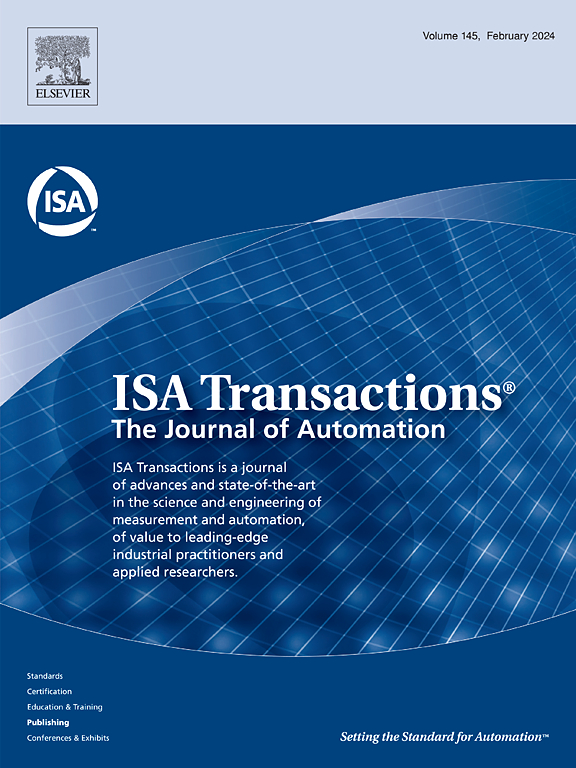保证瞬态性能的串联弹性致动器ℒ1 自适应谐振比控制。
IF 6.3
2区 计算机科学
Q1 AUTOMATION & CONTROL SYSTEMS
引用次数: 0
摘要
串联弹性致动器(SEA)技术在开发顺应型机器人关节方面前景广阔。尽管在实现精确跟踪方面取得了进步,但在控制振动和瞬态性能方面仍存在挑战。本研究通过将共振比控制(RRC)算法与 L1 自适应控制(L1AC)方法相结合,增强了该算法,以解决 SEA 位置控制中的过冲、静态误差和振动问题。首先,分析了由弹性传动结构引起的电机侧和链路侧之间的共振,这种共振会导致超调和振动,从而影响 SEA 控制的瞬态性能。随后,引入了基于 L1AC 的控制方案来提高性能。通过对关键控制参数的全面探索,证明了所提算法的稳定性。此外,该算法还增加了重力补偿,有效降低了预测误差和参考误差。因此,瞬态性能得到了改善。通过模拟和实验平台,以及与 RRC 和模型参考自适应控制算法的比较,验证了这一增强算法的功效。在所有实验中,过冲不超过 1.1%,链路侧的最大抖动幅度在 0.2° 以内,控制器中较大的时间常数能有效消除过冲和振动,响应时间延迟较小。此外,该算法在链路侧碰撞时表现出保护性响应,通过调节链路速度和限制电机电流来保护接触环境、人体和 SEA 本身,在干扰处理中利用了 L1AC 的低通滤波器(LPF)特性。本文章由计算机程序翻译,如有差异,请以英文原文为准。
ℒ1adaptive resonance ratio control for series elastic actuator with guaranteed transient performance
Series elastic actuator (SEA) technology is promising for the development of compliant robotic joints. Despite advancements in the realization of precise tracking, challenges persist in controlling the vibration and transient performance. This study enhanced the resonance ratio control (RRC) algorithm by integrating it with the L1 adaptive control (L1AC) method to address overshoot, static error, and vibration in SEA position control. Initially, the resonance between the motor and link sides caused by the elastic transmission structure was analyzed, which can result in overshoots and vibrations that affect the transient performance of the SEA control. Subsequently, a control scheme based on L1AC was introduced to enhance the performance. The stability of the proposed algorithm was demonstrated through a comprehensive exploration of key control parameters. Furthermore, the algorithm was augmented with gravity compensation, effectively reducing the predicted and reference errors. Consequently, the transient performance was improved. The efficacy of this enhanced algorithm was validated through simulations and experimental platforms, and comparisons with the RRC and model reference adaptive control algorithms. In all the experiments, the overshoot did not exceed 1.1%, the maximum jitter amplitude on the link side was within 0.2° , and a larger time constant in the controller could effectively eliminate the overshoot and vibration with a small response time delay. Furthermore, the algorithm exhibited a protective response during link side collisions by moderating link velocity and limiting motor current, to safeguard the contact environment, humans, and the SEA itself, which take advantage of the L1AC’s low-pass filter (LPF) properties in disturbance handling.
求助全文
通过发布文献求助,成功后即可免费获取论文全文。
去求助
来源期刊

ISA transactions
工程技术-工程:综合
CiteScore
11.70
自引率
12.30%
发文量
824
审稿时长
4.4 months
期刊介绍:
ISA Transactions serves as a platform for showcasing advancements in measurement and automation, catering to both industrial practitioners and applied researchers. It covers a wide array of topics within measurement, including sensors, signal processing, data analysis, and fault detection, supported by techniques such as artificial intelligence and communication systems. Automation topics encompass control strategies, modelling, system reliability, and maintenance, alongside optimization and human-machine interaction. The journal targets research and development professionals in control systems, process instrumentation, and automation from academia and industry.
 求助内容:
求助内容: 应助结果提醒方式:
应助结果提醒方式:


